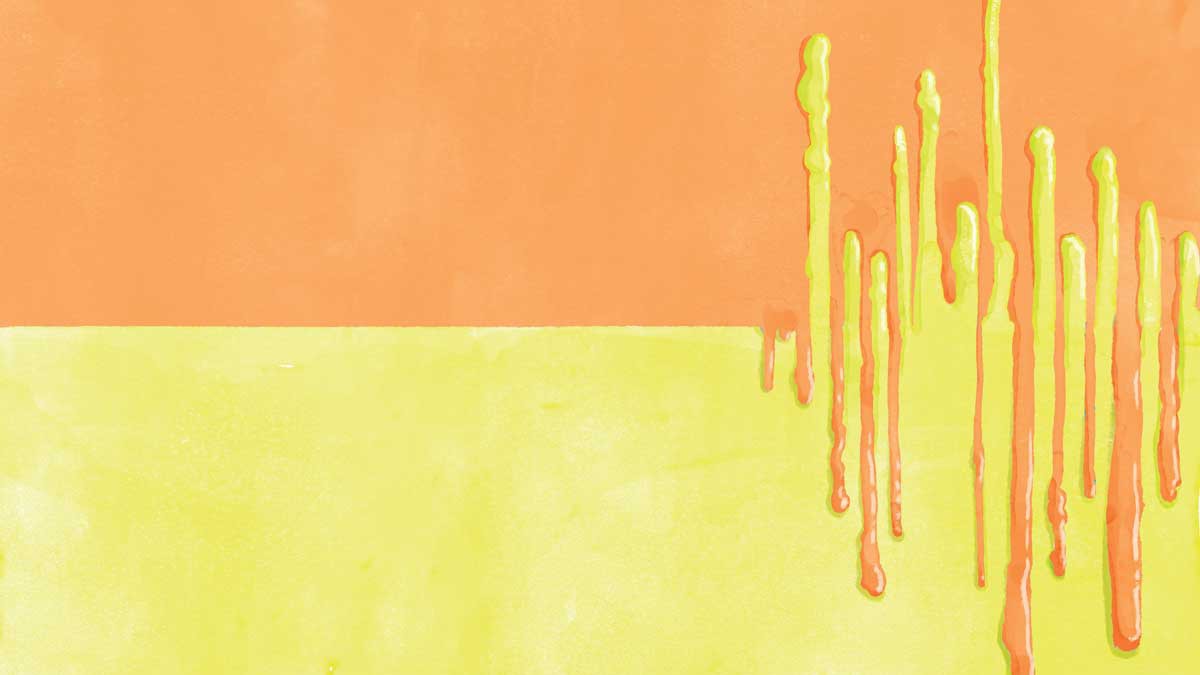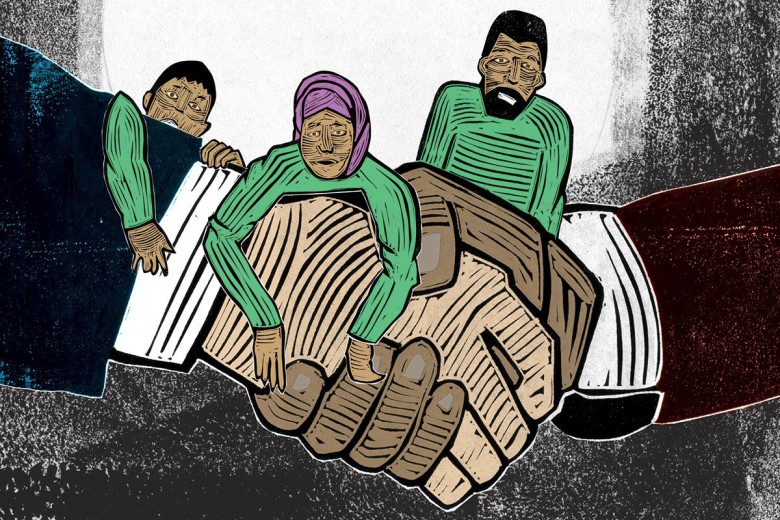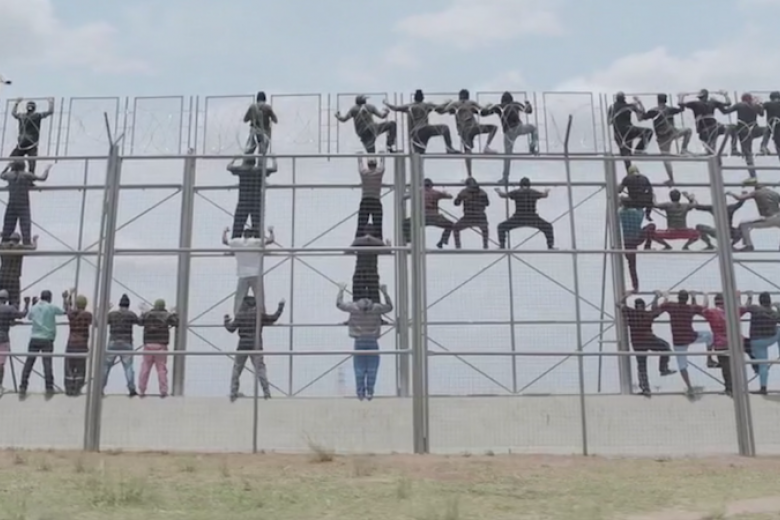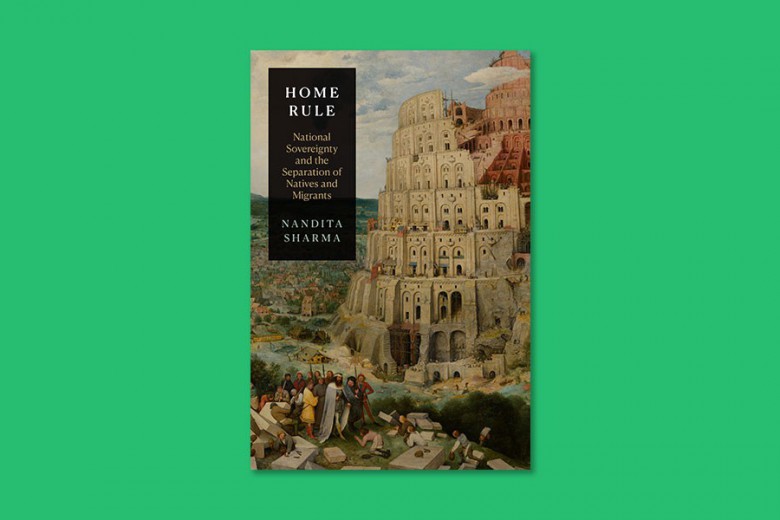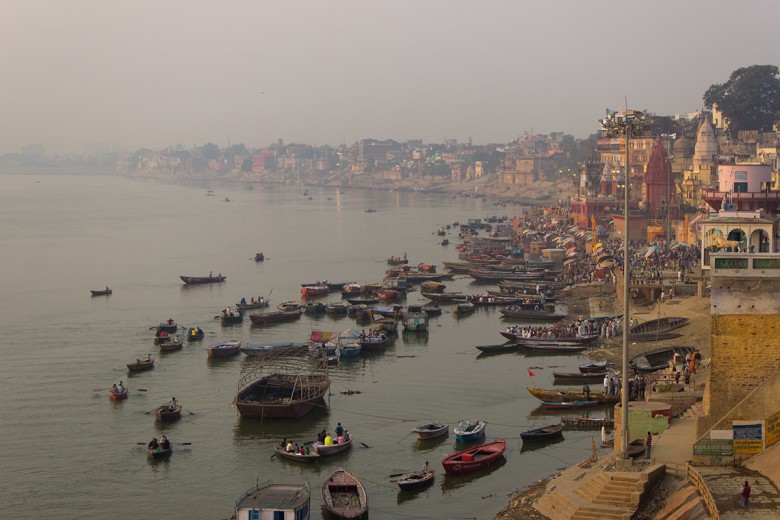On Borders
I
Borders exist at the periphery.
Denying, allowing entry, exit.
II
Borders exist within the nation state.
At schools.
At the health clinic.
At work.
Wherever immigration status allows, denies entry.
III
Borders extend beyond the periphery.
Europe, U.S., Canada interdict –
migrants and refugees are turned away hundreds of miles
from their/our shores.
IV
The border is the gate, and the borderlands.
“A border is a dividing line. A narrow strip along a steep edge. A borderland is a vague and undetermined place created by the emotional residue of an unnatural boundary. It is in a constant state of transition. The prohibited and forbidden are its inhabitants.”
—Gloria E. Anzaldúa
V
Borders are not closed
or open.
Goods move.
The rich move.
Men. Cis. White. Able bodied – move differently.
As do webs of Others.
Your body is allowed in.
Your dignity is not.
Your family is not.
VI
Everyone has immigration status
Citizen.
Resident.
Refugee.
Worker.
Undocumented.
Each of us are bordered.
VII
The enforcement of the border is collective.
It is the nurse. The teacher. The employer.
Allowing, denying entry.
It’s the journalist, the labour leader, the activist.
Asserting us, asserting them.
VIII
Borders exist because we
cannot
have not
imagined / produced
a world without borders.
The borders in our imagination prevent
us from building
real worlds without borders.
IX
Borders cause suffering.
Borders cause pain.
Borders kill.
Borders kill.
Borders kill.
That world beyond
I. She is another. A world. A world of worlds.
II. Here, accumulation of profit is abandoned. There are no wars. No rich, no poor.
III. The past has been made just in the present for the future.
IV. Liberation is collective. All of us.
V. Life is valid, valuable, and loved. All of life.
In this world, without wars, social oppression and strife, all Life would have enough to eat. A home to live in. A place to play. All languages would be welcome, most forms of expressions celebrated. In this world, a world where many worlds coexist, there would be no forced migration, no mass extinction. You would only go because your heart desired, or your community did. Borders, as we know them, would wither away.
I believe this world will exist. She is struggling to be born.
Unbordering in the present
Poetry will let me outline this future world, but I cannot map it into policy. I say freedom to move, to return, to stay; I sense the coordinates and possibilities, but my mind’s eye will not always let me chart a course.
Even after decades of immigrant rights organizing, I find myself asking, if hundreds of people start arriving and start accessing health care that they have not paid for, would that community not feel crisis?
In a world of climate catastrophe, as millions flee from rising sea levels, from droughts, from rain – how do we deal with mass migration on a finite planet?
And what if people start moving to a community – freely, of course – but there is just not enough of a sewage system, or enough roads, or enough housing? Would that not cause chaos?
And what of language, and identity? A large group of foreigners could result in loss of language or culture. Wouldn’t it import different and contentious notions of gender relations, labour, care, and time? Wouldn’t all this create xenophobia, racism, and tension?
And wouldn’t, in a world with some contested places where capitalism would still reign supreme, any hint of weaker immigration controls just mean colonialism, imperialism, and the flight of the rich with their resources?
And aren’t there other, more pressing, more primary concerns?
These questions and criticisms have been answered in many ways. In this future world, the one that will surely come, there will be enough resources for everyone. In fact, there already are. Systems won’t break, because there won’t be mass forced migration. And if we face enormous turmoil, we will quickly create dignified resettlement. And people who aren’t precarious, or escaping turmoil will not want to destroy language or culture.
The current mode of bordering, whether in China or Canada, results in immense deprivation of basic liberties for migrant and undocumented people. And there are no ‘fair’ immigration controls. And we can imagine societies without xenophobia.
And capitalism requires a global supply of labour, which is not possible without immigration controls. To transition away from capitalism, we must erode immigration controls. To erode immigration controls, we must move beyond capitalism. And climate change must also be met with mass resettlement of those displaced, and it can be.
But doubts and criticisms continue to be raised – by others, and by me. The borders in my head, in my dreams, do not allow my imagination to produce a world free of borders, and therefore free of prisons, or patriarchy, or class oppression by the rich.
On how to get there
I begin not at the level of social structures, policies, laws, regulations, or systems that must transition. Rather I begin by asking a much more fundamental question: how do we – those that believe in this other word but are straining to hear her, as Arundhati Roy asks us to – prepare ourselves to both imagine her, and build up the power necessary to bring her into being?
I begin with the belief that it is not possible for people like you and me – implicated deeply in a colonial, carceral, atomized capitalist system – to develop a collective structure of a transformed world. Not yet. If any one of us does so alone, away from struggles or relationships, we are sure to become authoritarian.
I believe, and I could be wrong, that our task in organizations (as collectives not solitudes), is to transform ourselves into beings capable of imagining and creating a just world. To do so, I suggest the following initial list of interrelated activities that organizations can undertake. Each of these is a process developed and constituted by many movements struggling for freedom, and none of these are my ideas alone. They only have value when they are all undertaken together.
1. Listening / investigating
To imagine and birth the world we aspire to live in we must first know where we are. Activists and organizers in large part are unaware of the context in which we find ourselves. Our understanding and therefore our imagination is limited. We speak in broad terms about issues, but cannot articulate how the hegemonic bloc of the ruling class is organizing itself culturally, or materially, or what the primary struggles are of our constituencies. This is a never-ending process. To return over and over to the ground, to place our ears to it, and develop mechanisms for organizations to assemble what’s being heard by each member into a real narrative of our collective experience.
2. Study
Today, most activists can answer the question, “what is cultural appropriation?” Almost none of us can outline an answer to “what are the effective methods of overturning material appropriation and theft by those who rule us?” Theories of organizing, methods of base-building, specific mechanisms of revolutionary work, questions about fundamental issues – what do we mean by justice exactly? What is capitalism in 2019 exactly? – are rarely engaged with by many activists and organizers. This must change. Reading, studying from elders, engaging in intellectual discussions have been excluded from political practice, dismissed as the terrain of elites. But without engaging with the specific methods of transformation, how are we to free our imaginations?
3. Struggle
Inversely, there are organizations and individuals that over-prioritize study, and ignore the work of collectivizing and/or winning material reforms in the lives of our people. Where ‘organizing’ is a priority, it is done without a focus on imagining just worlds. Rather, collectives, NGOs, and organizations try to create public spectacle in a way that shames or limits a government or corporation into minor reforms. Thus, year after year, decade after decade, the total number of people organized, engaged, and imagining the creation of new worlds does not expand.
4. Work
The majority of us spend the largest portion of our life engaged in work. For many of us, this work is alienating; our labour is extracted for profit. Even if we are in so-called non-profit industries – teaching, arts, nursing, professional organizing – capitalist logic pervades our lives. #BBHMM is trending, and anti-racist educators, artists, and others proudly demand payment. Capitalist work also engenders a particular form of coercive discipline, which has led to us believing that all discipline is coercive. We must instead develop ‘activist discipline’ – where doing a task, showing up, following through is a collective commitment to transformation. As many activists and organizations cannot immediately create alternative forms of economic survival for themselves or their members (though we must do so eventually), it is essential to engage in some work together – growing food, washing dishes, cleaning, creating materials – as a method of producing this activist discipline. It is through the practice of non-capitalist work that we can imagine a world that does not always require migrants, the poor, to be exploited in labour. We must reimagine a world where land does not belong to people, but rather we belong to the land.
5. People’s culture
We need our own songs, poetry, dance, ways of relating, loving, caring, and resolving conflict that are constantly expanded and shared. We need to intentionally produce a common people’s culture beyond carcerality, surveillance, and disposability – a common culture that expands imagination, counters atomization, transforms gender relations, and rejects scarcity. Developing this common culture is collective work – neither separate from ‘organizing’ or ‘activism,’ nor an area of expertise taken on by some as ‘artists’ or ‘educators’ separate from the rest of us.
6. Collective identity
An incredible amount of energy in recent years has gone – rightly – into articulating the nuanced and separated experiences of people. We must now do the same to articulate a unifying identity that connects all those struggling for justice, and facing a collective experience of exclusion. The notion of the working class did that for us at one point – perhaps it can do so again. To create a world where we are not divided by culture, or racism, or homophobia, or patriarchy, a world where jingoism does not reign supreme and immigration controls are not asserted, we have to believe in a common identity and practise it with ourselves, and then with strangers.
There is enough, we are enough
These are initial processes. There are likely more. The work of just transition toward a world without prisons, forced movement, rape culture, and white supremacy is all one and the same. While differences do and must exist between our current projects and campaigns, the collective project of all of us must be to create larger and larger groupings of people who – through their minds, bodies, and spirits – break free from the ideological and material constructions of our status quo world. As we become more and more liberated, these groups of people, together, will eventually be able to first imagine, and then produce the world we all aspire to. The work of first becoming aware of, and then removing the blockages in our imaginations has to happen in multiple avenues of our lives at once. We must all listen, study, struggle, work, build culture, create common identity together.
It is possible; it is certain. Freedom is coming.


